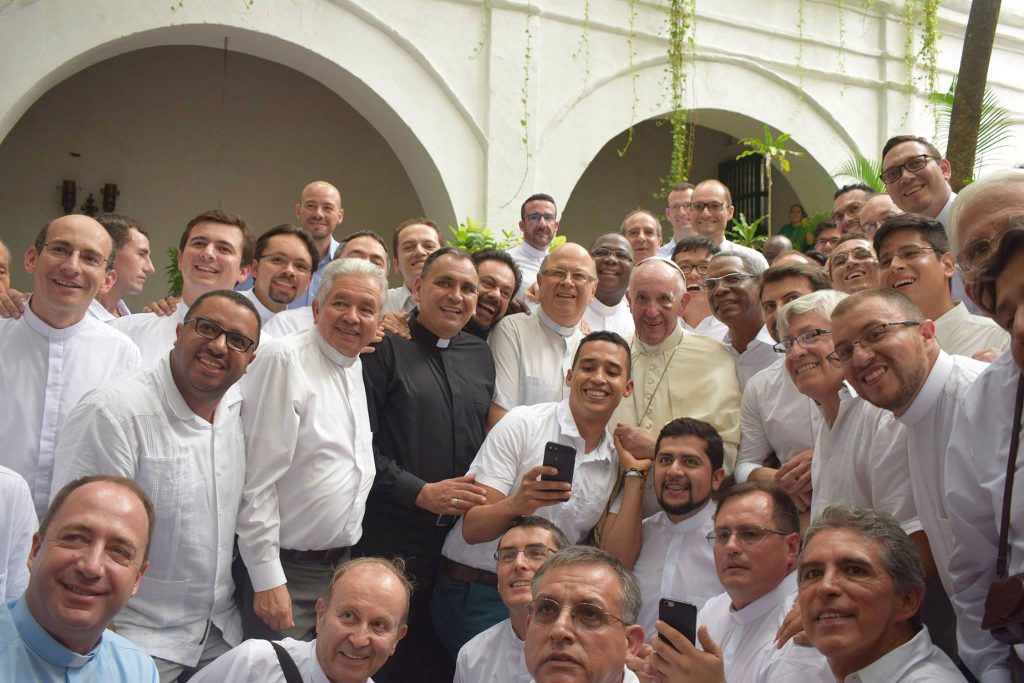SALTA, Argentina — Marking the 160th anniversary of the death of St. John Maria Vianney, patron saint of parish priests, Pope Francis published a letter encouraging and supporting priests from around the world, while thanking them for their daily service accompanying the people of God.
The letter has widely been described as spiritual and fraternal, penned by the pope and not his assessors, as many papal documents often are. Proof of this is the fact that it was written in Spanish, the pontiff’s native language.
For a man who’s often been labeled as being too critical of his own priests, denouncing clericalism, laziness, and corruption, the letter released the first weekend of August saw none of that. Instead, the document draws heavily on Scripture and Francis’ own teachings, and it can be read in the context of the Vatican’s ongoing response to the abuse crisis.
Most notably, of the 37 references found in the letter, there are three that don’t belong to Scripture or papal teaching, and two of them are attributed to Argentine priests Francis is known to have appreciated when they were still alive: Father Lucio Gera and Father Amelio Luis Calori.
The former, in particular, is a well-known figure in the Argentine Church, as he’s considered one of the fathers of the country’s main theological movement, the Theology of the People, known as a response to liberation theology.
“Truly significant is that he quoted Gera, Argentinian theologian, member of the Vatican’s first International Theological Commission,” said Father Fabian Baez of Buenos Aires. “The fact that he quoted him is a deserved recognition of this ‘master of priestly life.’ ”
Gera is also the mastermind behind the yearly youth pilgrimage to Lujan, which convokes a million people every first Sunday of October for a 40-mile walk from Buenos Aires to the country’s most well-known Marian shrine. Francis, when he was still Cardinal Jorge Mario Bergoglio, archbishop of Buenos Aires, attended every year.
“Personally, I felt like I was sitting next to him, hearing him speak to us, priests,” said Baez. The former parish priest of the shrine of San Cayetano — another place Bergoglio was known to love — Baez became famous in 2014 when the pope saw him in St. Peter’s Square and stopped the popemobile to give him a ride before the Wednesday audience.
Francis’ letter to priests has a lengthy section that is dedicated to the pain caused by the clerical sexual abuse scandals, with priests feeling “themselves attacked and blamed for crimes they did not commit.”
“I welcomed the letter as a gift from God,” Baez told Angelus News. “Light in hard times. I was comforted by its hopeful reading and the certainty it gives of God’s hand in these difficult times for the Church.”
Father Máximo Jurcinovic, from San Isidro, in the outskirts of Buenos Aires, said that the letter was a “wave of support” in a difficult moment when the Church is, “understandably,” seen through “its weaknesses, due to the process of purification it’s going through.”
“It brings me joy and consolation that the pope is setting his eyes on the many priests who every day work for the kingdom of God, with the rights and wrongs, but working with honesty to care for the flock that was entrusted to them,” Jurcinovic said.
The letter, the Jurcinovic noted, is not only addressed to clerics but to the whole Church, inviting the faithful to contemplate how to better accompany priests, to pray for them and to find the best way to evangelize during difficult times.
“The Holy Father has always asked us not to deny the horrors that we’re living and that occur in our Church, but it’s good that he’s invited us to also look toward the priests who remain firm by their people, visiting the infirm, aiding the poor, working in their communities, and who are respected by the people of God,” Jurcinovic told Angelus News.
Bishop Daniel Fernandez of Jujuy, in northern Argentina, also welcomed the letter, calling it an “unexpected gift.”
By dedicating his missive to the pain that the Church, including survivors but particularly priests, have experienced due to the abuse crisis, Fernandez said that the pope is telling priests that “also in this I’m next to you. When others look at us with distrust, we mustn’t cease to give thanks to God for the immense majority of priests who fulfill their mission.”
Fernandez is the president of the Argentine bishops’ conference commission for ministries. He said that the letter was a response to the pope’s feeling that priests around the world needed to “experience his paternity and through him, God’s paternity.”
Baez said that he was particularly moved by the “missionary spirit” of the letter, its “pastoral courage and its spiritual wisdom that leaves one with the flavor of a father who’s speaking to the heart and from the heart.”
“Brave, realistic, faithful, and hopeful, it’s indispensable for walking with faith and hope during these times of crisis,” Baez said.
In his letter, Francis wrote that the Catholic Church is “firmly committed” to carry out the reforms needed to encourage from the outset “a culture of pastoral care, so that the culture of abuse will have no room to develop, much less continue.”
“This task is neither quick nor easy: it demands commitment on the part of all,” the pope continued in the letter.
“If in the past, omission may itself have been a kind of response, today we desire conversion, transparency, sincerity and solidarity with victims to become our concrete way of moving forward. This in turn will help make us all the more attentive to every form of human suffering.”

